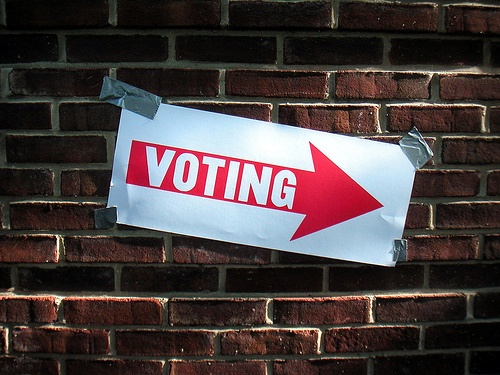Despite budget squeeze, NC lawmakers poised to step up anti-voter fraud spending

This week, North Carolina state lawmakers put forward a budget plan that calls for tens of millions of dollars in program cuts -- sacrifices that Republican leaders say are necessary since the state will be collecting $1.57 billion less in revenues through 2015 due to hefty tax cuts approved last year.
But at least one program is getting a boost in the plan proposed by the Senate: a request from the N.C. State Board of Elections, led by Kim Strach, to add three new investigators to tackle alleged voter fraud.
While the Senate's budget eliminates at least 12 positions from the Department of Health and Human Services, the latest budget plan released Thursday [pdf] calls for $201,657 in new funding "for three new positions to investigate fraud in elections, discrepancies in voter registration information, including duplicate registrations, and to pursue prosecution for violations of election law."
According to news reports, Strach had asked for five new investigators to focus on voter fraud. This was addition to the state board's May 2014 hire of former FBI agent Chuck Stuber, who has been tasked with investigating voter fraud and campaign finance issues.
Strach's bid for more voter fraud investigators follows the state board's highly-publicized announcement in April 2014 that it had supposedly identified thousands of suspect voter records in North Carolina. After running the state's voter list through Interstate Crosscheck, a database run by Kansas Secretary of State Kris Kobach -- a staunch advocate of strict voter ID laws -- Strach's office said it had found 35,750 cases where voters with the same name and birth date had allegedly voted in North Carolina and another state.
After Strach's announcement in April, House Speaker Thom Tillis and Senate leader Phil Berger swiftly issued a statement expressing their alarm at "evidence of widespread voter error and fraud," and headlines in state and national media outlets warned of a massive voter fraud epidemic in North Carolina. State Rep. David Lewis, a leader on election law in the General Assembly, launched a fundraising website trumpeting the fraud claims.
But Kobach and advocates of the Interstate Crosscheck program have little evidence to back up claims of widespread fraud. As election experts and political scientists have documented, most of the duplicate records are likely due to clerical and other administrative errors. As Kobach admitted in a fall 2013 presentation, out of 84 million records analyzed by Crosscheck since its launch in 2005, only 14 have been referred for prosecution -- and none have resulted in a conviction.
This is in line with dozens of studies conducted over the years that have found real voter impersonation fraud to be negligible. In a roundup of the scholarly research, government inquiries and media investigations into the issue, The Washington Post in July 2014 concluded that "there is overwhelming scholarly and legal consensus that voter fraud is vanishingly rare, and in fact non-existent at the levels imagined by voter ID proponents."
While only a tiny piece of North Carolina's $21 billion-plus budget, the additional funding for staff to investigate voter fraud does raise questions about the priorities of lawmakers and state elections officials. For example, the Republicans' budget doesn't include -- and the N.C. State Board of Elections apparently didn't request -- a boost in resources to monitor money flooding into state races. But North Carolina's 2014 primary elections in May revealed an agency struggling to process the deluge of campaign finance reports in a timely manner.
Before the primaries, the Employees PAC filed a report that was received by the state board on April 23, detailing $126,000 worth of election spending. But it wasn't posted to the agency's website until May 8 -- 15 days after elections staff stamped it as "received," and two days after the primaries had already passed. Similarly, reports of election season spending by the Natural Resources Defense Council, NC Chamber, NC Homeowners Alliance and Southern Environmental Law Center were all marked as received by state board staff in April, yet these filings also failed to get posted to the N.C. State Board of Elections website until May 8, after the primaries.
The election board says it will offset some of the price tag of the new investigators by cancelling a $117,415 data services contract, with the work to be done instead by staff. Earlier this spring, the N.C. State Board of Elections experienced embarrassing glitches on its website during the May 2014 primaries after cancelling a software contract and moving the work to office staff.
The budget now moves to the state House, where it's expected to receive a final vote by the weekend.
Tags
Chris Kromm
Chris Kromm is executive director of the Institute for Southern Studies and publisher of the Institute's online magazine, Facing South.
